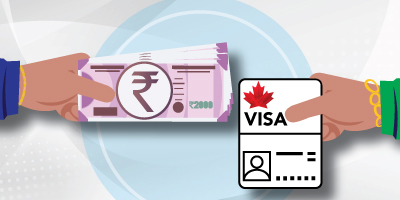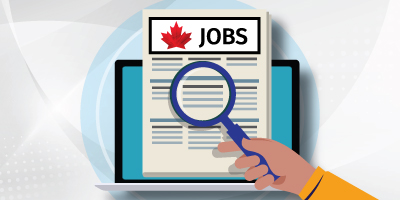Know the rules before you apply to travel to Canada from India

There are scammers making guarantees about working, studying or travelling in Canada. They charge a lot of money for bad service or no service at all. Their actions can have serious consequences for you and your family.
No one can guarantee you a visa
Scammers will tell you that you meet the criteria for a visa, even if you don’t, so that they can take your money. Don’t be fooled. Find out if you’re eligible to come to Canada(opens in a new tab) .
On this page
Using a visa agent
You can apply for a visa on your own, or you can use a visa agent (called a “representative” in Canada). The agent helps you fill out forms, and they can also submit applications on your behalf. If you use a representative, you must include this information in your application. If you don’t, the application could be refused, and you could be banned from applying for 5 years.
Learn about visa agents (representatives)
There are 2 types of representatives:
- Unpaid representatives help you with the application process without charging a fee, and they often include friends and family members. They fill out forms and submit your application for you, for free.
- Paid representatives must be authorized in Canada to charge money for their services. They fill out forms and submit your application for you, for a fee.
Authorized representatives are regulated professionals who understand Canada’s immigration and application processes. They can be lawyers, paralegals, Quebec notaries, or consultants registered with the College of Immigration and Citizenship Consultants(opens in a new tab) . They can explain the different visas, advise you on your application, and communicate with the Government of Canada on your behalf.
Learn more about authorized representatives(opens in a new tab)

Be careful when hiring unauthorized visa agents
We won’t deal with visa agents who charge a fee but are not authorized representatives. If you use an unauthorized representative, we may return your application or refuse it.
Hiring a visa agent will not help your application get processed any faster or guarantee that your visa will be approved. Agents do not have special connections with Canadian visa officers. Canadian immigration officials follow the same steps and rules when reviewing all applications, whether you hire an agent or apply on your own.
If your application was refused, make sure you understand why it was refused before you reapply. Applying again with the same information is a waste of your time and money. It will not change the decision, and it will cost you more.
No one can guarantee that your visa will be approved.
Learn about unauthorized agents
If you hire an agent to help you fill out the application, ask people you trust to recommend an agent they used to get a visa. Get advice from a few people before you choose.
If the agent applies on your behalf, remember these tips:
- Both of you have to fill out and sign the Use of a Representative Form(opens in a new tab) . Failure to declare information on your application is considered lying, and your application may be refused.
- Ask to be present when the agent submits your application through IRCC’s online system to make sure it gets sent. A lot of scammers will tell you that they’ve sent in your application, but they haven’t.
If you’re paying someone for their services
- ask for a written contract and breakdown of the IRCC fees and the services you’re paying for
- get a signed receipt for every payment you make
Consequences of fraud
Don’t lie or send fake documents
It’s a serious crime to lie on an application or send fake or altered documents. Your application will be refused and you could be banned from Canada for at least 5 years.
You’re responsible for the information you give in a visa application even if you use a visa agent.
If a Canadian visa officer finds false information on an application, you’re the one who will face the consequences—not your agent.
You’re responsible for the information in your application
If someone tells you to lie on a visa application or give fake documents, they are putting you and your family at risk.
Never sign blank forms or applications given to you by a visa agent.
Before you sign your application, make sure that all the information in your application and supporting documents is true and that you understand everything.
Consequences of sending fake documents or information
If you send false documents or information or your agent does
- your application will be refused
- you could be banned from Canada for at least 5 years
- you could have a permanent record of fraud with IRCC
The Canadian government works with partners to train officers and watch for fake documents.
Application fees
Don’t waste your money
You and your family shouldn’t be spending your life savings on an application. It costs around 6,000 (CAN$100) to apply for a visitor visa. Beware of scammers who charge a lot more than that. Application fees are the same for everyone.
Application fee examples
- temporary resident visa (visitor visa): $100 (6,000)
- work permit*: $155 (9,300)
- open work permit*: $255 (15,500)
- study permit*: $150 (9,100)
- biometrics: $85 (5,100)
You must pay to have your fingerprints and photo (biometrics) taken, but making an appointment is free.
Fees are given in Canadian dollars, followed by approximate rupee conversions.
Learn more about fees for applications and services(opens in a new tab) .
* Once a study or work permit is approved, a visa will automatically be issued at no extra charge.
Beware of fake job offers and student scams
Scammers around you and on the internet will promise to get you a work or student visa for Canada. They may also tell you that once you get a visa, you will be able to apply to become a permanent resident (PR).
No one can guarantee you a visa or PR.

Fake job offers
Before a Canadian company can hire a foreign worker, they must try to hire someone in Canada. The company has to get a document from the government that gives them permission to hire a foreign worker. The document is called a labour market impact assessment (LMIA), and it costs the company 60,200 (CAN$1,000) for each worker they want to hire. The company must pay this fee.
If a job offer sounds too good to be true, it’s probably a scam. Research the company and the job offer to make sure they’re both real before you pay a visa agent to help you.
Learn more about working in Canada(opens in a new tab) .
Find out how labour market impact assessments affect you
Canadian companies have to pay the fee for the labour market impact assessment (LMIA). The government does not let the worker pay the cost. Beware of companies, recruiters or agents who ask you to pay this fee. If the company does not comply with the requirements to hire a foreign worker, the LMIA could be revoked, and your visa could be cancelled.
If the LMIA is approved, your employer should give you a copy of the approval letter for you to include with your work permit application. You need the LMIA approval letter before you can apply for the work permit.
Job offer scams
It could be a scam if
- a recruiter charges you money to find a job
Note: Honest companies pay recruiters to find workers, so you shouldn’t have to pay for a job offer. - you’re asked to pay money up front for the right to apply, the labour market impact assessment (LMIA), training, or supplies like tools or a uniform
- a recruiter or employer promises that you can move to Canada and start working in a few weeks
- the wages seem too high for the job or region
Note: The Government of Canada Job Bank(opens in a new tab) lists average wages by occupation and city. You can enter the city or postal code for the job and find its salary range. - the job description is vague (for example, location, duties, benefits)
- no experience is required
- no interview is required
- a recruiter or employer promises that once you have a job, your family can move to Canada
- permanent residence (PR) is guaranteed once you’re working in Canada
Note: No one can guarantee you PR.
Research the company before you pay a visa agent to help you
Many companies will post job openings on their website. If the position offered to you is not on the company’s website, it could be a scam. Ask your friends or family in Canada to research the company and the job offer to make sure they’re both real.

Student scams
If you’re applying to study in Canada:
- Make sure the school is a designated learning institution (DLI).
- Don’t apply for a study permit without an acceptance letter.
- Always pay tuition fees directly to the school.
- Check to see if your school has services for international students.
If you want to work in Canada after graduation, make sure you’re eligible for a post-graduation work permit (PGWP).
Don’t let a scammer take your dream away.
Learn more about studying in Canada and working after graduation(opens in a new tab) .
What’s a designated learning institution?
Not all schools in Canada can accept international students. A designated learning institution (DLI) is a school that’s approved to host international students. If you want to study in Canada, make sure the school you’re applying to is on the designated learning institutions list(opens in a new tab) .
Services for international students
Many schools have services to help international students learn about living in Canada, the city, weather, finding somewhere to live, health care, scholarships and many other things.
Who can apply for a post-graduation work permit?
Not all designated learning institutions (DLIs) and not all programs of study make you eligible for a post-graduation work permit (PGWP). Review the DLI list(opens in a new tab) to see which schools offer programs that make you eligible for a PGWP. Learn more about working in Canada after you graduate(opens in a new tab) .
Student scams
You may be getting scammed if a visa agent or student recruiter
- tells you to apply for a student visa without an acceptance letter from a designated learning institution (DLI) in Canada
Note: You need the acceptance letter before you can apply for a student visa. The DLI will send the acceptance letter directly to you. - promises you a letter of acceptance from a DLI if you pay them
Note: If someone makes that promise, they’re likely part of a scam. An honest school will assess your language and academic abilities before providing any admission documents. - tells you that they can get you a discounted tuition rate for a fee
Note: Speak with the school directly to discuss fees. - asks you to pay money to apply for a scholarship or to guarantee that your scholarship is approved
Note: Applying for a scholarship is usually free and no one can guarantee you will get one. - tells you that you can stay in Canada for much longer than the length of your study permit
- tells you that all DLIs and programs of study can make you eligible for a post-graduation work permit (PGWP)
Protect yourself and your family
Scammers want to take your hard-earned money and give you false promises of guaranteed visas or permanent residence (PR). Don’t be fooled: if it sounds too good to be true, it probably is.